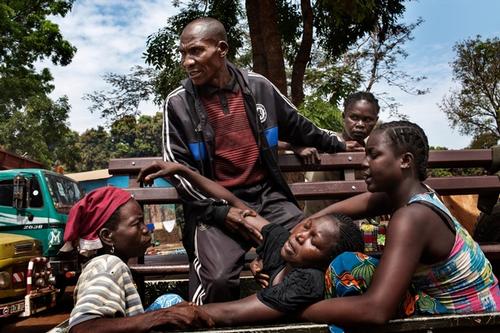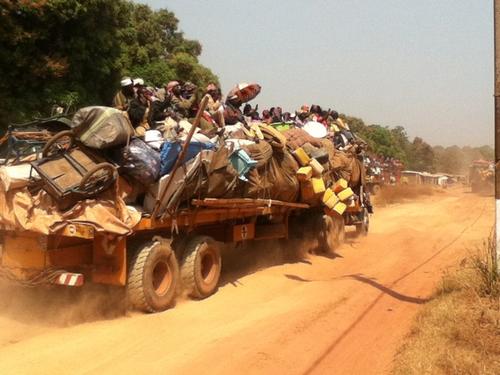In Bossangoa all the houses in town are empty. Since the beginning of December the whole population has moved into two camps as violence has escalated along religious identity lines. In one camp, 30,000 Christian civilians who were threatened by Seleka militia, in the other camp 8,000 Muslims who live in fear of the anti-Balaka militia.
The latest sad episode came on the morning of Thursday 30 January , which saw 8 000 displaced Muslim people in Bossangoa preparing to load their families and possessions on a fleet of hired trucks, fleeing the country in terror.
This group has been living in an empty school in Bossangoa, too scared to return to their homes, some of which are only a few hundred metres away. After numerous incidents of violence in the last few days - in which several hundred Muslims have been killed in villages outside of Bangui - the Muslim population is now trying to leave the town and the country out of fear of violence.
It soon became apparent that the 20 trucks would be able to transport only a fraction of the 8, 000 people that gathered, desperate to escape the country.
Men stayed behind
Women and children were given priority on some trucks, as men elected to stay behind, having sent their families to safety. “I am sending my family on the truck but I am going to stay because there is no space for me,” one man told the MSF team. “I will try to follow later.”
Fear turned to despair when it became apparent that not all the displaced people would be evacuated on the convoy, under the escort of the Chadian army.
Many people have been traumatized not just by the violence, but by the sudden upsurge of hatred along religious lines, in the country they call home.
“I was born here, I don’t understand the hate towards us,“ another man told us. “We are the ones who are traders here… I sell sugar and coffee. I want to come home when there is peace in Central Africa.”

MSF emergency activities
In Bossangoa the MSF team supports the hospital and provides medical assistance to all 35,000 civilians living in both camps, regardless of religious, ethnic or political affiliation. Since the beginning of October MSF has carried out over 176 surgeries in the Bossangoa hospital of which the majority are violence related. More than 600 children were admitted to the program for severe malnutrition and over 14,000 consultations were performed of which over 6000 were malaria cases. MSF is providing water and has constructed latrines in both camps.MSF started emergency activities in Bossangoa in May 2013 after heavy violence forced thousands of people to leave their homes and seek shelter in makeshift camps.
Escalating violence, revenge killings, arson and looting in the Central African Republic have displaced more than 900,000 civilians since July 2013 according to UNOCHA. While much attention has focused on the plight of people living in urban centres such as Bangui and Bossangoa, there are enormous numbers of people who have fled into the bush. MSF is gravely concerned that these people are living in conditions that make them vulnerable to diseases such as malaria, and has deployed mobile outreach clinics to provide basic healthcare to some of the of people who are still hiding in the bush. Uncounted numbers of displaced people still have no access to health care, food, clean drinking water and shelter.



